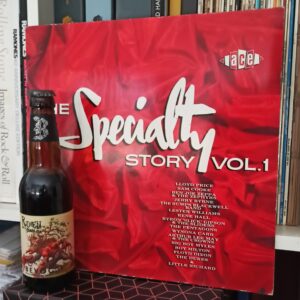
featuring…
♫ Various Artists, The Specialty Story Vol. 1
🍺 Bevog Rudeen Black IPA
Words & photos: Vincent Abbate
Entry #33 in the Listening Party series. That number – inevitably calling to mind the rotational speed of a long-playing record – sent me back to the shelves that hold my modest collection of vinyl LPs. (At least the ones I’ve acquired in Germany; the 500+ albums of my youth reside in a walk-in closet in upstate New York.) There, I settled upon The Specialty Story Vol. 1 – a flea market find from the mid-1990s. I recall putting a few standout cuts from this record on a mixtape back when spending hours punching buttons on a tape deck was something I took pleasure in. Also, I had the time for it. Where have those days gone?
Some 25 years later my favorite songs off the album haven’t changed and I’ll be featuring them here today.
Over on the beer side of things, we’ve got something deep, dark and Austrian to dive into – Rudeen Black IPA from Bevog, the inventive brewer we first came across in Listening Party #14.
I’m not feeling especially deep or philosophical today, so this one will be a straightforward mix of historical facts and upbeat tunes infused with the rock’n’roll spirit.
Blues had a baby, remember?

The Discogs website – an invaluable resource – informs me that The Specialty Story Vol.1 (Ace Records # CH 134) originally appeared in 1985 and is not especially rare or valuable. There are several gems among the 16 singles it compiles, dating mostly from the era when rhythm & blues was morphing into rock’n’roll in the mid-1950s. Specialty’s most renowned alumnus, Little Richard, was of course one of the most prolific and influential stars of the early rock’n’roll boom.
Alabama native Arthur Lee Maye didn’t enjoy that kind of fame but did excel in two different walks of life: Besides making a name for himself as a doo-wop and R&B singer, he somehow managed to play 13 seasons of Major League Baseball for five different clubs. He was already playing in the Milwaukee Braves minor league system when he and his singing group, The Crowns, recorded “Gloria” for the Specialty label in 1956. It was a rather syrupy number whose B-side, “Oh-Rooba-Lee,” outrocked it by a mile.
https://youtu.be/8Xwp0gMEi18
René Hall is another name that may not instantly ring a bell, but the musician’s resumé impresses. During his decades-long professional career, the Louisiana-born arranger and session guitarist contributed to classics like Sam Cooke’s “A Change Is Gonna Come,” Ritchie Valens’ “La Bamba” and Marvin Gaye’s “Let’s Get It On.” The simple and catchy instrumental “Twitchy” – released under the name “Rene Hall’s Orchestra featuring Willie Joe” in December 1957 – sounds nothing like any of them. Must be the strange metallic sound of the Unitar.
Credit where credit is due: The “Willie Joe” featured on that track is Willie Joe Duncan, a regular on Chicago’s Maxwell Street in the early 1950s who busked for a while alongside Jimmy Reed. The Unitar was his calling card – a homemade one-string electric guitar. Through his guest spots on “Twitchy” and another Specialty Records gem, Bob Landers’ “Cherokee Dance” (b/w “Unitar Rock”), Duncan managed to leave a small but indelible mark on pop music history.
Before we get to sampling Bevog’s Black IPA, I’m curious about the name Rudeen. What’s that about?
My email to the company got a surprising answer from its international sales and strategy manager. “The name Rudeen has no meaning. It’s a made-up name like most of the names of the beers from Bevog’s core line.” There you have it.
(Disclaimer: I’ve never had a black IPA before this one. Didn’t know they existed until very recently. So the following appraisal is not a comparison with other black IPAs. I go in open-minded and curious, with no preconceived notions other than the brewer’s claim that Rudeen actually lies somewhere between a stout, a porter and an IPA. Here goes …)
Well. Rudeen is no lightweight. It clocks in at 7.4% AVB, qualifying it in Germany as a Starkbier. And it is a strong character for sure. After admiring the dark brown hue, fluffy tan head and rich chocolaty scent – like checking out a girl from across the room – I got up my nerve and said hello to this so-called black IPA. The first exchange was slightly awkward. The flavor is nothing if not assertive. Though it looks like a porter, it’s fairly bitter. Hmm.

Moments later, I’m enjoying our conversation. Rudeen is a rich, bold beer with plenty of spirit. One that grabs your attention anew each time you raise the glass to your lips. Somewhere in the middle, I’m reminded of an espresso. And by the time we say goodbye … well … for all the intensity I experienced initially, the final few drops are smooth going down, which tells me we’ve made friends in a matter of minutes.
Loyal readers … the glass is empty. Far too soon. I sit here now, examining the lacing patterns Rudeen left behind, filled with longing, feeling I could do with at least one more. Which brings me to “Till the Well Runs Dry.”
It’s a killer number that leaves you wondering why Wynona Carr (aka Sister Wynona Carr) never had a true hit back in the day. As music historian Billy Vera writes in one source text: “Wynona had the looks; she was as talented as the Ruth Browns and LaVern Bakers; she was ambitious; she had a record company that gave her good material and good production values; she made records that were in the commercial pocket of the time. She just didn’t get lucky.”
“Till the Well Runs Dry” was part of the third single Wynona Carr cut for Specialty in 1956 after shifting away from gospel to R&B the previous year. The A-side, a New Orleans-style rocker called “Should I Ever Love Again,” is at least as good – powerful and edgy, Carr possessed a voice that could cut through concrete like butter. On the playful “Till The Well Runs Dry,” she uses those husky pipes of hers to whip up a jump and jive tornado.
Thus, we reach the end. A shame, as I feel like staying around a little longer. Next week will come around soon enough, though. Time has a way of speeding by. So … see you then.
* * *
The Who Is Blues Listening Party is powered by Bierlager, one of Germany’s finest addresses for premium craft beer.

